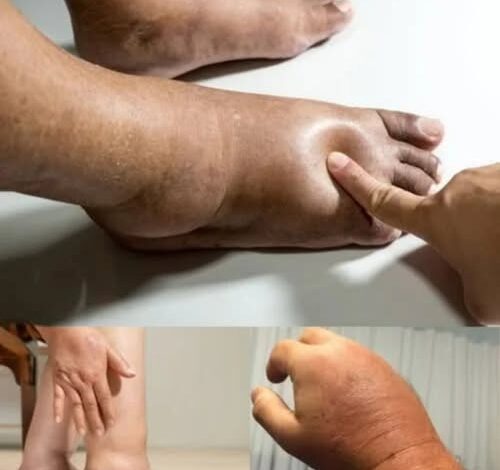Swollen Hands and Feet: How Simple Foods Can Help Restore Balance Naturally

Swelling in the hands, feet, or ankles—often called edema—is something millions of people experience at some point in their lives. For some, it comes after a long day of standing. For others, it’s tied to hot weather, certain foods, or even travel. While swelling can sometimes point to underlying medical conditions that require professional care, in many cases, it can be gently improved by paying closer attention to how we nourish and hydrate our bodies.
Instead of immediately relying on strong diuretics or quick fixes, nature offers a variety of foods and lifestyle habits that can help the body restore its own balance. By understanding what swelling really is—and how food, hydration, and circulation play a role—we can make small, powerful changes that bring comfort and support long-term health.
What Exactly Is Swelling (Edema)?
Edema happens when excess fluid builds up in tissues, making parts of the body—often the feet, ankles, legs, or hands—look puffy, tight, or uncomfortable. While people often assume it’s “just too much salt,” the truth is more complex. Swelling is influenced by several factors, including:
Leaky capillaries: Small blood vessels can become fragile, allowing fluid to escape into surrounding tissue.
Poor lymphatic flow: The lymph system is the body’s drainage network, and when it slows down, fluid doesn’t move as it should.
Mineral imbalance: Sodium and potassium work like partners in fluid regulation, and when they fall out of balance, swelling can occur.
Dehydration: Ironically, not drinking enough water makes the body hold onto fluid, creating puffiness.
Understanding these root causes helps explain why some people swell after long flights, salty meals, or even certain types of exercise.
Why Food Matters More Than We Think
Food is more than just fuel—it’s information for the body. Every bite we take tells our cells how to behave. Certain foods send the message to hold onto water, while others encourage the body to release excess fluid and restore balance.
Pharmacy shelves are filled with pills that reduce water retention, but many natural foods act as gentle, supportive diuretics without stripping the body of important minerals. These foods not only help flush excess fluid, but also repair fragile blood vessels, calm inflammation, and boost circulation.
The Healing Power of Foods for Swelling
Here are some of the most powerful everyday foods that support healthy circulation and reduce fluid retention naturally:
Watermelon – Nature’s Hydrating Hero
With its high water content and anti-inflammatory compounds, watermelon is one of the most refreshing foods for anyone struggling with swelling. It hydrates deeply, supports kidney function, and reduces tissue inflammation. A simple bowl of watermelon can do more for fluid balance than many salty sports drinks.
Pumpkin Seeds – A Mineral Powerhouse
These small seeds pack big benefits. Rich in magnesium and potassium, pumpkin seeds support healthy fluid regulation and prevent excess sodium from causing bloating. They also contain anti-inflammatory fats that protect blood vessels and improve circulation.
Celery – Gentle and Cleansing
Celery is often overlooked, but it’s one of nature’s quiet detoxifiers. Acting as a gentle diuretic, it helps the body flush excess sodium and water. Celery juice or crunchy celery sticks can refresh the system and support kidney health.
Pineapple – Clearing the Pathways
Pineapple contains bromelain, an enzyme known for reducing inflammation and clearing blockages in the lymphatic system. By supporting lymph flow, pineapple helps keep fluid moving instead of pooling in the hands and feet.
Ginger – Warming and Circulation-Boosting
Ginger improves circulation by warming the body and encouraging blood flow. Better circulation means less pooling of fluids in extremities and more even hydration throughout the body. A simple ginger tea can have a noticeable effect.
Red Onions – Capillary Strengtheners
Red onions are high in quercetin, a plant compound that strengthens fragile capillaries and helps reduce leakage of fluid into surrounding tissue. They are also naturally cleansing and anti-inflammatory.
Blueberries – Vessel Protectors
Blueberries are rich in anthocyanins, powerful antioxidants that strengthen blood vessels, reduce inflammation, and protect circulation. A handful of blueberries daily supports overall vascular health.
Foods That Can Make Swelling Worse
Interestingly, not all “healthy” foods are beneficial when it comes to swelling. Some surprising culprits can actually make the problem worse:
Overly concentrated smoothies with raw kale or spinach can contribute to mineral imbalances.
Processed protein bars often contain hidden sodium, additives, and preservatives that increase water retention.
Excessive caffeine or alcohol can dehydrate the body, ironically leading to more swelling later.
This doesn’t mean these foods must be avoided forever—it’s about balance and learning what your body responds best to.